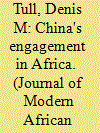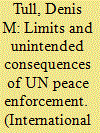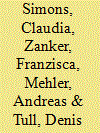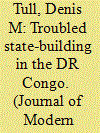|
|
|
Sort Order |
|
|
|
Items / Page
|
|
|
|
|
|
|
| Srl | Item |
| 1 |
ID:
073996


|
|
|
|
|
| Publication |
2006.
|
| Summary/Abstract |
China's vastly increased involvement in Africa over the past decade is one of the most significant recent developments in the region. It appears to contradict the idea of international marginalisation of Africa and brings significant economic and political consequences. China's Africa interest is part of a recently more active international strategy based on multipolarity and non-intervention. Increased aid, debt cancellation, and a boom in Chinese-African trade, with a strategic Chinese focus on oil, have proven mutually advantageous for China and African state elites. By offering aid without preconditions, China has presented an attractive alternative to conditional Western aid, and gained valuable diplomatic support to defend its international interests. However, a generally asymmetrical relationship differing little from previous African-Western patterns, alongside support of authoritarian governments at the expense of human rights, make the economic consequences of increased Chinese involvement in Africa mixed at best, while the political consequences are bound to prove deleterious.
|
|
|
|
|
|
|
|
|
|
|
|
|
|
|
|
| 2 |
ID:
064901


|
|
|
| 3 |
ID:
158104


|
|
|
|
|
| Summary/Abstract |
Recent scholarship has discerned an increasing tendency of the UN Security Council to push the boundaries of UN peacekeeping beyond traditional doctrine by equipping peace operations with ever more robust and even peace enforcement mandates. The first and most frequently cited example of this turn is the so-called Force Intervention Brigade (FIB) in the DR Congo. Yet, a comprehensive account of the FIB experience is still missing. Authorized in March 2013 to launch offensive military operations against insurgent groups, the FIB may come to epitomize a sea change in the transition from robust peacekeeping to a qualitatively different kind of UN peace operation. Thus, studying the FIB can offer important insights about the advantages and challenges that may be in store for the UN, should the organization indeed turn towards peace enforcement. The articles analyses the origins, performance and consequences of the FIB in terms of conflict resolution and state-building. It also examines its organizational impact on the UN peace operation in which it was embedded (Monusco). It finds that the FIB has not proven to be the game changer. Instead, it had unintended negative consequences both on state-building and the performance of UN peacekeepers.
|
|
|
|
|
|
|
|
|
|
|
|
|
|
|
|
| 4 |
ID:
087829


|
|
|
|
|
| Publication |
2009.
|
| Summary/Abstract |
The UN peacekeeping mission in the Democratic Republic of Congo (MONUC) has been derided as one of the world's least effective peacekeeping forces. This article assesses its performance by using two indicators: mandate implementation and the reduction of human suffering. The analysis shows that effective peacekeeping in the Democratic Republic of Congo (DRC) has been hampered by two major problems. First, MONUC has had a struggle with, and inconsistent approach to, the vague concept of 'robust peacekeeping'. During key moments of the peace process, it tried to wage peace when it should have used force. Second it failed to adapt to a dynamic conflict environment. Both problems were underpinned by flawed assumptions about the peace process, the behaviour of local actors and the presumed benefits of 'post-conflict' elections.
|
|
|
|
|
|
|
|
|
|
|
|
|
|
|
|
| 5 |
ID:
080964


|
|
|
|
|
| Publication |
2008.
|
| Summary/Abstract |
Postconflict state reconstruction has become a priority of donors in Africa. Yet, externally sponsored reconstruction efforts have met with limited achievements in the region. This is partly due to three flawed assumptions on which reconstruction efforts are predicated. The first is that Western state institutions can be transferred to Africa. The poor record of past external efforts to construct and reshape African political and economic institutions casts doubts on the overly ambitious objectives of failed state reconstruction. The second flawed assumption is the mistaken belief in a shared understanding by donors and African leaders of failure and reconstruction. Donors typically misread the nature of African politics. For local elites, reconstruction is the continuation of war and competition for resources by new means. Thus their strategies are often inimical to the building of strong public institutions. The third flawed assumption is that donors are capable of rebuilding African states. Their ambitious goals are inconsistent with their financial, military, and symbolic means. Yet, African societies are capable of recovery, as Somaliland and Uganda illustrate. Encouraging indigenous state formation efforts and constructive bargaining between social forces and governments might prove a more fruitful approach for donors to the problem of Africa's failed states
|
|
|
|
|
|
|
|
|
|
|
|
|
|
|
|
| 6 |
ID:
124262


|
|
|
|
|
| Publication |
2013.
|
| Summary/Abstract |
Research on power-sharing in Africa remains silent on the effects of national peace agreements on the sub-national level. Conversely, most armed conflicts originate and are fought in (or over) specific areas. A plausible hypothesis would be that for power-sharing to have the desired pacifying effect throughout the national territory, it needs to be extended to the local level. Based on fieldwork in six former hotspots in Liberia, Burundi and the Democratic Republic of Congo (DRC) we find that there is hardly any local content, including local power-sharing, in national agreements. However, contrary to our hypothesis, neither local content (inclusion of actors or interest) nor local-power-sharing (either introducing a local power balance or monopoly) are indispensable to effectively bring about local peace, at least in the short-term. On the contrary, it might even endanger the peace process. The importance of the sub-national level is overestimated in some cases and romanticised in others. However, the history of spatial-political links, centralised policies, and the establishment of local balances or monopolies of power ultimately play an important role.
|
|
|
|
|
|
|
|
|
|
|
|
|
|
|
|
| 7 |
ID:
165048


|
|
|
|
|
| Summary/Abstract |
Nearly six years after the onset of international intervention in 2013, the security situation in Mali continues to deteriorate. Despite a plethora of security sector assistance initiatives, the Malian army is struggling to become a more effective fighting force. This article analyses security sector assistance by describing local responses to international intervention. Based on original research in Bamako and dozens of interviews with Malian army officers and foreign advisers, diplomats and defence officials it traces the mutual perceptions of interveners and their Malian interlocutors. The author shows that both sides hold often diverging views of the analysis of the problem (a weak army), their respective roles, as well as the appropriate modalities and strategies of army reconstruction. While interveners routinely bemoan a lack of local ownership, Malians are exasperated by what they depict as the invasive and paternalistic behaviour of external actors who negate the existence of Malian expertise and agency. The dissonance triggers forms of subtle resistance against externally-driven reform that undermines cooperation. Yet, strong mutual interests in the perpetuation of cooperation imply that Mali and its international backers are locked into a dysfunctional partnership that none of the two sides has an incentive to leave.
|
|
|
|
|
|
|
|
|
|
|
|
|
|
|
|
| 8 |
ID:
101176


|
|
|
|
|
| Publication |
2010.
|
| Summary/Abstract |
This paper examines contentious state-society and centre-periphery relations in the DR Congo and their implications for state-building. Since the 2006 post-conflict elections, the state's authority has come under fire in the western province of Bas Congo, where a politico-religious group (Bundu Dia Kongo) has emerged as a serious challenger. Enjoying huge local legitimacy, the group has articulated political grievances that the newly elected central government has violently repressed. As locally perceived, elections are a legitimising tool in the hands of the government to impose its unfettered authority in the name of the state-building project. Furthermore, and backed by donors, the Kinshasa authorities also refuse to implement a wide-ranging decentralisation reform. This has fed disenchantment about post-conflict politics in Bas Congo, boding ill for democratic politics and the prospects of state-building in the DR Congo.
|
|
|
|
|
|
|
|
|
|
|
|
|
|
|
|
|
|
|
|
|